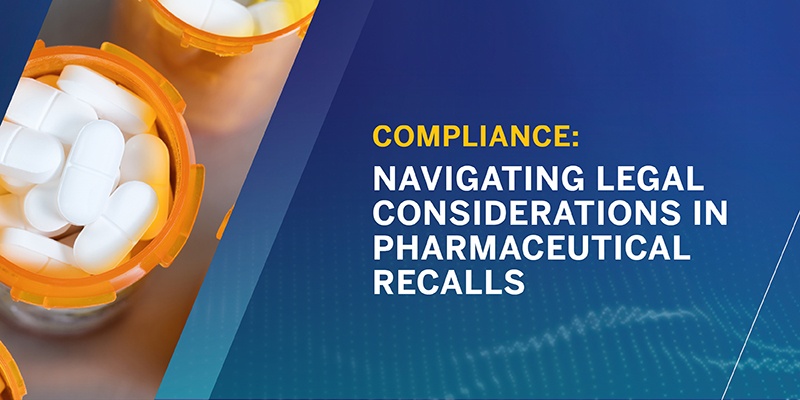
Pharmaceutical recalls are among the most sensitive and high-risk operations a life sciences company can undertake. When safety, compliance, and public trust are on the line, the stakes are already high—but the legal complexity surrounding recalls adds yet another layer of challenge. While much focus is placed on operational readiness and regulatory reporting, companies must also proactively address the legal implications that can arise before, during, and after a recall event.
1. Antitrust Considerations: Avoiding Anti-Competitive Pitfalls
In the midst of a recall, collaboration across the supply chain is essential—but it must be handled carefully to avoid running afoul of antitrust laws. Actions that may appear cooperative—such as sharing information or coordinating market responses—can be misinterpreted as collusion or market manipulation if not legally vetted.
Pharmaceutical companies should consult legal counsel early in the recall planning process to ensure that all communications and collaborative efforts, especially those involving competitors or distributors, are conducted in a way that aligns with antitrust regulations. Even unintentional violations can result in investigations, fines, or litigation, making it essential to proactively establish legal guardrails around market interactions during a recall.
2. FDA Compliance and Reporting: Staying Aligned with Regulatory Requirements
The U.S. Food and Drug Administration (FDA) sets clear expectations for how pharmaceutical recalls should be initiated, executed, and documented. Failure to comply with these requirements—such as delays in reporting, insufficient documentation, or ineffective communication—can lead to regulatory penalties, increased scrutiny, or additional enforcement actions.
To mitigate these risks, companies should have a robust compliance framework in place that includes:
- Prompt identification and reporting of safety issues
- Thorough documentation of all recall-related actions
- Timely notifications to healthcare providers, retailers, and consumers
- Clear escalation protocols for decision-making and regulatory engagement
Legal teams must work closely with regulatory and quality assurance departments to ensure all recall activities are fully aligned with FDA requirements and timelines.
3. Liability and Risk Management: Protecting the Company from Legal Fallout
A poorly executed recall can open the door to product liability lawsuits, class actions, and reputational damage. If a recalled product causes harm or if the recall process itself is deemed negligent, companies may face costly litigation and long-term brand erosion.
To limit exposure, companies should develop and regularly update a comprehensive recall plan that integrates legal risk mitigation at every stage. This includes:
- Pre-established legal review processes for recall decisions
- Insurance coverage evaluations
- Documentation procedures that can support legal defense if needed
- Regular mock recall drills that test both operational and legal response capabilities
Proactively addressing legal vulnerabilities not only protects the company during a crisis but also demonstrates a commitment to consumer safety and corporate responsibility.
4. Data Privacy and Consumer Protection Laws: Safeguarding Sensitive Information
Recalls often require companies to contact healthcare providers, pharmacies, or even individual patients. This process may involve handling personal health information (PHI) and other sensitive data, raising critical compliance issues under laws like HIPAA, GDPR, and various state-level privacy regulations.
To remain compliant, companies must ensure that any data collected, shared, or stored during a recall is handled in accordance with applicable privacy laws. This includes:
- Securing appropriate consent where required
- Minimizing data exposure to only what is necessary
- Encrypting and securely storing personal data
- Training employees on data handling protocols
Failure to meet data privacy standards can lead to regulatory fines, loss of consumer trust, and additional legal complications.
Conclusion: A Legal Lens is Essential for Effective Recall Management
Pharmaceutical recalls are more than operational exercises—they are complex events that require strategic legal oversight. By addressing antitrust concerns, ensuring FDA compliance, managing liability, and safeguarding consumer data, companies can navigate recalls with greater confidence and less risk.
Legal preparedness is not just a protective measure—it’s a business imperative. Companies that integrate legal considerations into every phase of recall planning and execution are better positioned to respond effectively, protect their reputations, and maintain public trust.
From antitrust issues to liability concerns, pharmaceutical companies need a well-rounded legal strategy to successfully manage recalls without triggering costly legal exposure. Below are four key legal areas companies must consider to ensure compliance and reduce risk during a pharmaceutical recall.
